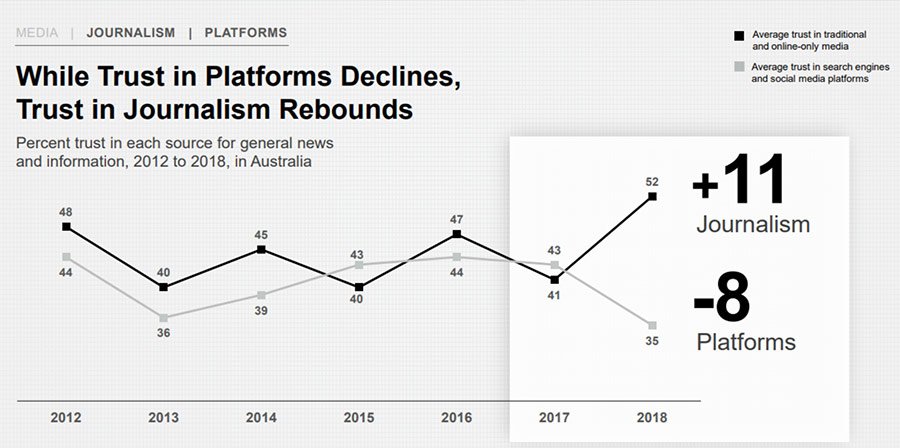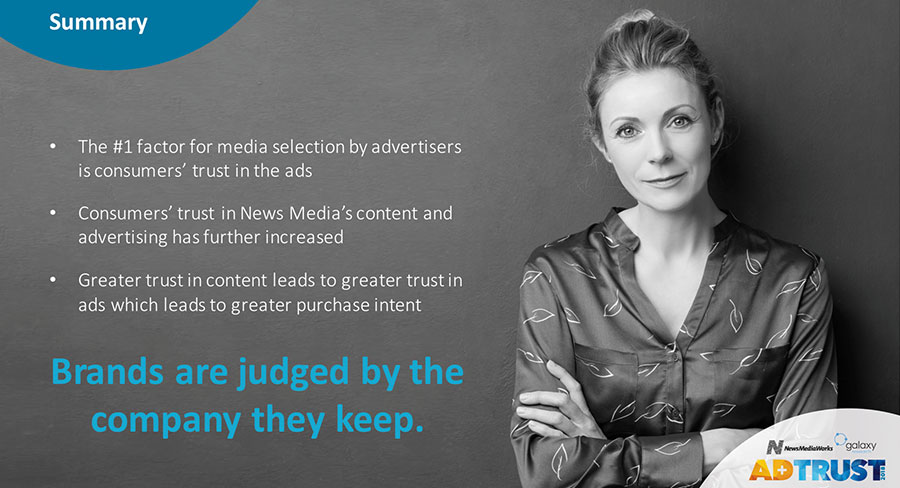Australians’ trust in social media channels has fallen in the wake of the Cambridge Analytica scandal and concerns about data privacy, while trust in newspapers, news websites, radio and television has risen sharply, the second Adtrust study by Galaxy Research has revealed.
News industry marketing group NewsMediaWorks has presented the results.

The study has surveyed more than 4,200 Australians over the past 12 months and has now been replicated in three countries across Asia. It measures consumers’ trust in the content and advertising in the media they consume across 10 media channels, and found a direct correlation between the two.
The media tested included Newspapers (National, Metro, Regional, Community), Television, Radio, Magazines, Cinema, Outdoor, News Websites, Non-news Websites, Social and Search. Results are represented as net figures: that is, the percentage of those that trust a medium minus the percentage of those that mistrust a medium.

Source: Edelman
Consumer trust in the content on social media channels has fallen to -20 and trust in ads has dropped to -28 in just under 12 months since the inaugural study was undertaken. The majority of Australians (58%) trust Facebook less than they did six months ago and nearly two-thirds (63%) said they do not trust advertising on Facebook.
Conversely, trust in the content of printed newspapers has risen 13 points to +48 and trust in ads rose 10 points to +38, again making newspapers the most trusted media for both content and ads. News websites were the most trusted digital channel for content and ads.
In addition, the study found that trust drives purchase intent, with 58% agreeing that the more they trust an ad, the more likely they are to buy a product or service.

“Consumers are now well aware that their personal data is being commercialised and, in some instances, their privacy traded for profit and, as a result, have honed their media choices. The further erosion of trust consumers have in social media demonstrates they are tuned into the real news, nearly all of which has been revealed by quality newspapers and news websites. That’s where advertisers should be headed too,” said NewsMediaWorks CEO, Peter Miller.
“The facts are irrefutable – trust in content and trust in ads go hand in hand. And where do brands go when they are seeking to rebuild lost trust in their organisations? They run ads in newspapers – as National Australia Bank, KFC and, ironically, Facebook have done in recent months.
“Brands are indeed judged by the company they keep and we are seeing a flight to quality, with consumers relying more on established news brands they trust and proactively dismissing messages – either content or ads – they see in media they distrust.”
Trust in advertising also changes with age, with respondents under the age of 35 having higher trust in all media channels than older users, especially those aged over 55. Younger users, despite being heavier users of digital media, ranked ads in newspapers as the most trustworthy of all media, with the study recording a pronounced drop in their trust of ads in social media and non-news websites.
Get a full copy of the report here.
—
Top photo: Vasin Lee / Shutterstock
